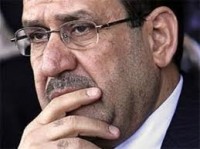Maliki’s Own Party Urges Him Not to Run for a third term
Maliki’s Own Party Urges Him Not to Run for a third term
Posted, 25/08/2013
 High-ranking officials in the State of Law Coalition are trying to prevent their leader, Prime Minister Nouri al-Maliki, from running for a third term in the 2014 legislative elections.
High-ranking officials in the State of Law Coalition are trying to prevent their leader, Prime Minister Nouri al-Maliki, from running for a third term in the 2014 legislative elections.
Leaders in the State of Law Coalition, led by Iraqi Prime Minister Nouri al-Maliki, are trying to convince the prime minister not to run in the upcoming legislative elections, fearing that it could spell the end of the coalition itself.
An official from the coalition told Al-Monitor that a meeting was held with Maliki in mid-August, in the presence of the most-prominent officials from among the elites of the Islamic Dawa Party and the State of Law Coalition. The meeting included serious discussions about the political future in light of the developments of the current political crisis.
The official, who attended the meeting, said that Maliki was clear about his intentions to run for a third term in the upcoming legislative elections, which raised the ire of a number of members of the coalition. He also indicated that officials from the Islamic Dawa Party got into verbal altercations following conflicting positions regarding Maliki’s decision.
The official, who preferred to remain anonymous given the sensitivity of the subject, indicated that high-ranking officials — including ministers and senior advisers in the government — told Maliki that his insistence on running for a third term embarrassed the State of Law Coalition, and may lead it to lose its popularity in the upcoming elections.
It is worth mentioning that Sunni and Shiite political blocs oppose Maliki’s third term as prime minister of the federal government.
The official reported that Maliki’s opponents within the coalition said they submitted to the latter a proposal stipulating that a member of the Dawa Party may run for this post, which will ease the political pressure against the party due to Maliki’s insistence.
The official asserted that, during the meeting, Maliki was harshly criticized in a manner unprecedented since he took office in 2008.
“Maliki was told that the Shiite parties will not tolerate his decision to run for a third term and that if he were to be the prime minister of the 2014 government, the Iraqi street would be inflamed by a new vicious war,” the official said.
However, the source noted, “Maliki responded to his critics and opponents from within his coalition by issuing a stern warning that he would run for the next legislative elections as an independent candidate if he has to.”
The official stated that Maliki was upset about the positions of key officials in his coalition, but that he will likely insist on presiding over the government in the coming period.
“Maliki feels that he is facing a major challenge and that he must pass this difficult political exam,” added the official.
However, Saad al-Matlabi, a Shiite politician close to Maliki, told Al-Monitor, “Maliki has made up his mind to run for prime minister again if he obtains a majority of votes in the legislative elections of 2014.”
Local media quoted Jawad al-Bazoni, a Shiite politician who defected from the State of Law Coalition, as saying, “Maliki will run for elections on an electoral list including only the Islamic Dawa Party.”
Bazoni said, “It is unlikely that the religious authority Ali [al-Husseini] al-Sistani approves Maliki’s effort to bring back dictatorship rule.”
On the other hand, according to the Sadrist movement, Maliki’s attempt to run for a third term will aggravate the political crisis in the country.
In this respect, Jawad al-Hasnawi, an Iraqi member of parliament from the Ahrar Bloc, told Al-Monitor, “Maliki’s candidacy for a third term would lead Iraq into a state of major political congestion.”
Yet, it seems that the conflicting statements and positions on Maliki and his third term stem from different political interests, especially since there is only one year before the parliamentary elections scheduled in 2014. It is clear that the support for or opposition to Maliki’s decision fall within the scope of competition among the most prominent leaders of the parliamentary blocs in the country.
On the other hand, it is difficult to determine the balance of Maliki’s popularity and his ability to mobilize more support, especially in light of the deteriorating security situation and the continuing sharp disagreements between him and Sunni and Kurdish leaders as well as with some Shiite leaders.
These circumstances led several Iraqi observers to talk about Maliki turning into the losing party in the political process. However, some believe that he still has a chance to win.
al-monitor.com
